
You are currently on the light version of the episode. The interactive version, much more beautiful, is here - available only from a computer.
VIDEO
English subtitles are available, click on CC...
MAGAZINE

ADDA is a grocery store offering organic and local products at reasonable prices. You can find free food collected at the Nantes Market, but it is also a place where you can have a cup of coffee, give or take objects, share a meal, take part in cooking workshops or learn how to repair your bike.
ADDA is a neighborhood place where you can borrow DIY tools or sewing machines, where you can exchange, give or take clothes, offer services and activities and find information about a variety of topics.
ADDA is a neighborhood place where everyone can feel at home and free to arrange, change, adapt, propose or create anything and everything.
Adda offers all of this and a lot more.
ADDA is a network of people who trust you. No one checks if you have paid exactly for what you have bought. They let you be in charge of what you want to be in charge of. They encourage you in your projects and help you achieve them.
ADDA is a place created by the people for the people and which is run without any paid worker nor mandatory participation. It is financially independent.

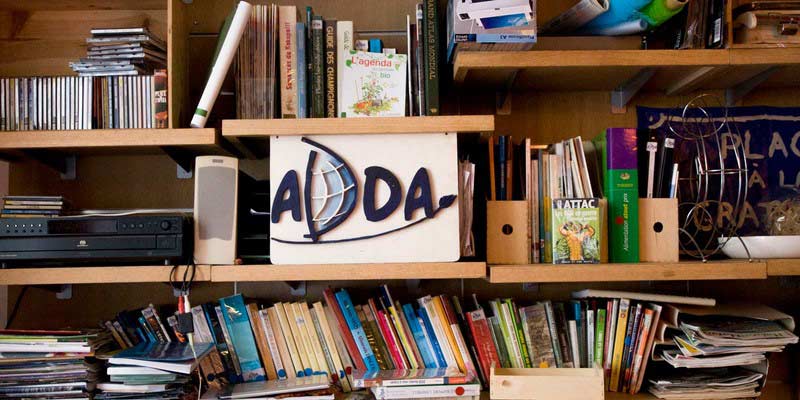

In the early 2000's, Xavier became aware of the natural resources diminishing and decided to learn about everything linked to this problem: peak oil, carbon constraint, climate change, and so on. He started telling people about it, informing his family and friends. With Claire, his partner, they felt compelled to act concretely to help people grow an environmental awareness and change habits. They gathered some friends and created ADDA: association for food-based sustainable development*.
* Reckoning that the term 'sustainable development' was being debased, the association members got rid of it. The name ADDA has remained, together with its original motto: Today let's restore Tomorrow (in French : AujourD'hui restaurons DemAin).
Interview. Caire and Xavier Pétillon talk how ADDA started. (English subtitles available)
« Our intention was not to proselytize but to pool and share our energies, skills and everything we know in order to move in another direction with those who want to. »
Claire
Since then, ADDA has changed a lot: it has become a well-established neighborhood association counting nearly 300 members. Many projects have been initiated there, some have failed and others have evolved and flourished.
Today, ADDA is real and has proved its worth. It has demonstrated it is possible to have a place that enables all these things to happen. Simple things, when you think about it, yet so rare in reality. It did not happen easily, without conflicts or doubts, it is a human adventure that reflects all aspects of human interaction.
« ADDA is what it is today thanks to all the people who are part of it, or have been part of it »
Claire
ADDA is not a model to follow as such. ADDA is not a concept. ADDA is the sum of the energies, willpower and personalities of those who have been involved in it. If you wanted to create a similar project elsewhere, ADDA could only share its own experience and story, necessarily different from yours.

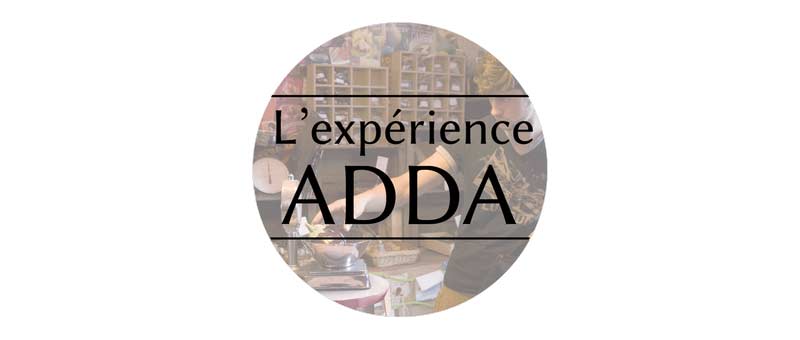
The way in...
... is the grocery store
The focus could have been housing or transport, but Claire decided to choose food as a theme to raise awareness and encourage people to take action. Because food concerns all of us...
« The people who decide to come here are interested in getting quality products at a reasonable price »
Mika
In the grocery store, you can find everything produced in the area, from beer to herbal tea as well as flours and cheese. Non local products can also be found yet they have been carefully selected, like the chocolate, and are labelled as coming from long distribution channels. Fruits and vegetables are mainly sold by the box.
« For each product, there is a different operating cost. The farmer sets the price and we sell according to this set price »
Claire
Deliveries are always grouped together with other travels - which would have taken place no matter what - in order to limit the association's carbon footprint. This is done consistently, even if it means that some products will be unavailable for a while.
The grocery store guarantees
the association financial independence.
Besides attracting people living in the neighborhood, the grocery store guarantees the association financial independence.
Sales margins are limited in order to guarantee quality local and organic products at a reasonable price*. Together with the memberships (between 10 and 30 euros per year), they cover all the expenses and even generate a little surplus which will enable solidarity group loans or funding other projects.
* The sales margins are set at 5.5% for local products, 20% for the others, and 1 euro for every fruit and veggie box.
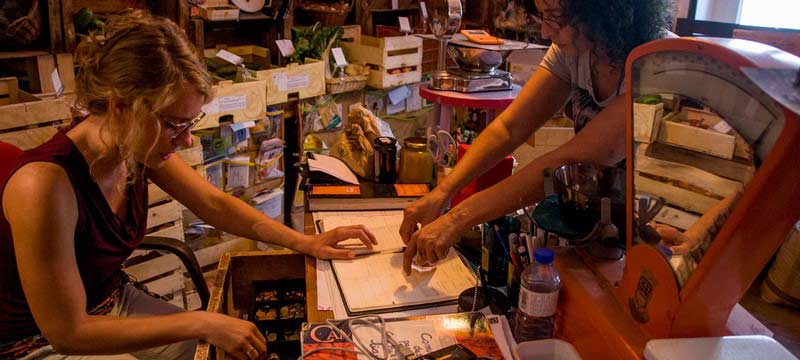

« Thinking about those who are not mobile,
those who do not have money
and giving them the choice
to come or not, or to come for some time... »
Claire
In view of being available to all, including those who do not have much visibility of their budget, box orders are open from one week to another, without obligation of duration. The association however pays the farmers several months in advance to facilitate their cash flow.
« The solidarity boxes mean that people can also have access to healthy food without being labelled 'poor' »
Mika
Realizing that some people did not buy fruit and veggie boxes at the end of the month or did not buy anything at all because of prices still being too high, the association gave the possibility to the members to buy boxes for 6 or 4 euros (limited to 7 boxes for each delivery). No justification is ever asked for this. The system relies on trust..
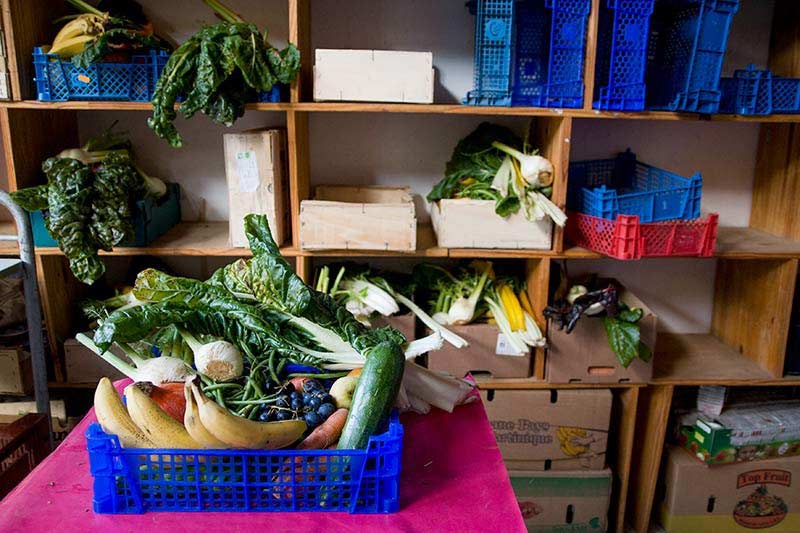
Box of organic fruits and vegetables.
Trust
Trust is one of the key words at ADDA. It is trust that undoubtedly contributes to the success of the project and the implication of the members.
Trust allows the members to calculate how much they owe by themselves and anyone can have access to the order books and receipts. It is also present in the way tasks are carried out by anyone volunteering.
This trust imposed itself little by little but the more it was present, the more it developed.
"As soon as we started sharing bookkeeping, there were no more errors, it was magic"
Claire

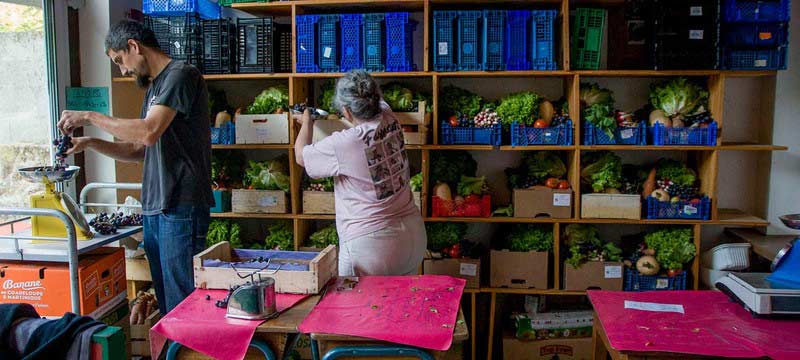

Another way in
is the 'free of charge'
The 'free of charge' is the name given to the food collected at the MIN, the national market of Nantes, second largest market in France.
Three times a week, two association members go there to collect the unsold products about to be thrown away. Each time, they bring back between 30 and 60 crates full of fruits and vegetables.
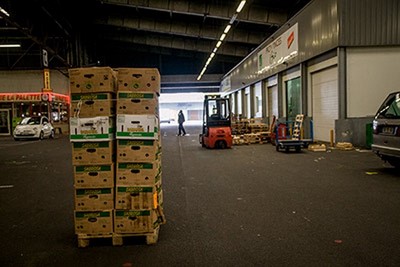
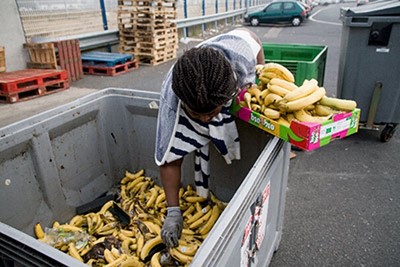

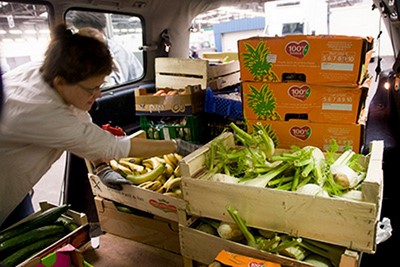
The organic products also collected are added to the boxes that are given out the very evening. What is not organic can be taken in self-service and the rest - usually what needs to be consumed or cooked immediately - is 'rehabilitated' in the afternoon.
'Rehabilitated' means the food is cooked with care and imagination by the ADDA volunteers present that day.
These products will then be available for sale in the grocery store. These are the 'ADDA products': jams, dried fruits, cooked vegetables, etc.
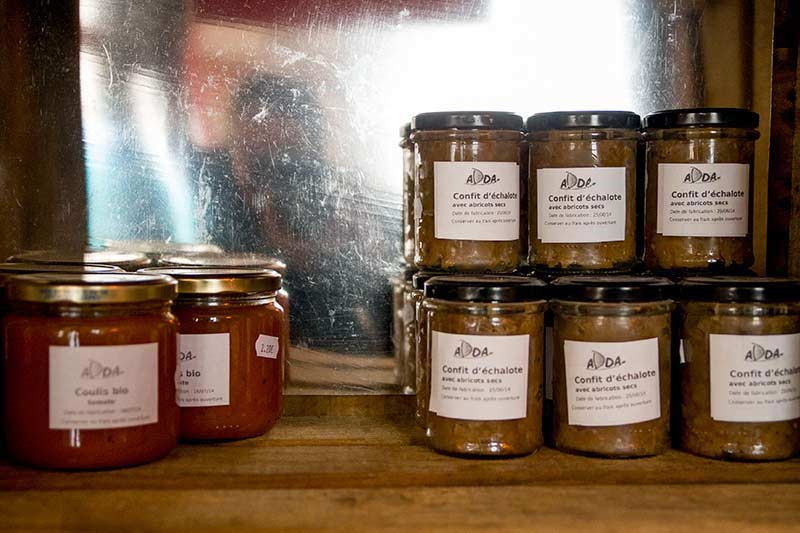
The members transform ADDA products
with 'dying' products and/or
coming from the free of charge channel.
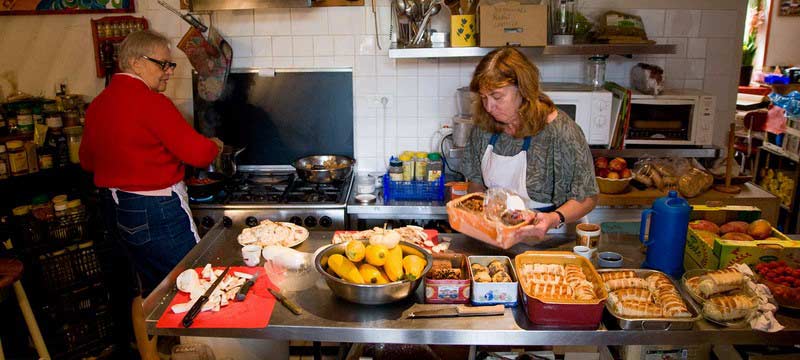

ADDA however is not limited to food and acts on a larger scale. As large as the desires and willower of its members...
« If you have a project and you want to put it into action and share it with others, it is possible »
Mika
Many projects were initiated right from the beginning:
- "ADDA Fashion" enables to exchange, give and take clothes.
- A cupboard is available for storing little objects to give away, and people can leave paper ads for larger objects.
- There is a list that sums up the shared tools (from DIY tools to reception tableware or a 60-litre pressure cooker).
- Small conferences entitled 'What I have learnt about...' which offers to share your knowledge and learn information about topics others know about are held.
- There are regular workshops (cooking, fixing bikes...)
- There are also shared meals, several times a week, during which each participant brings food to share.
- ...And many more projects that the association members are preparing...
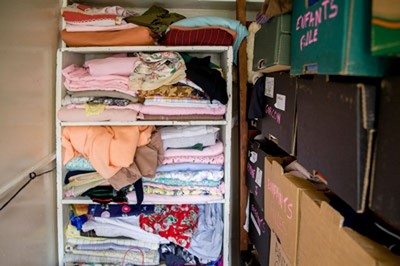
The clothes from the ADDA fashion
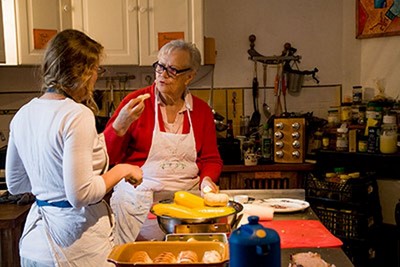
Cooking workshop
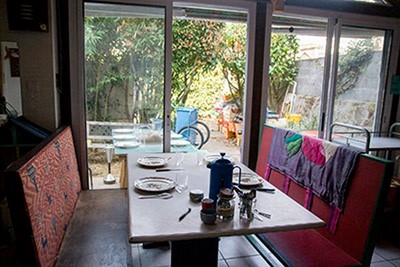
Shared meal
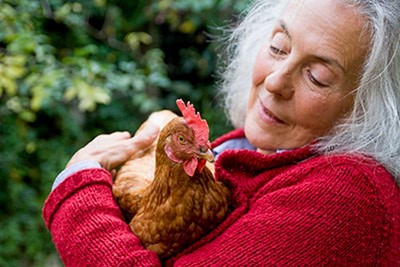
The chicken in the shared garden
« The shared meals are delicious moments: we get to taste different flavors, links are made, people meet, projects get started »
Claire
ADDA is also in contact with several groups and organisations in town. This is how, in partnership with the association of the Carterie neighborhood, ADDA has helped reclaim a wasteland. It has been transformed into a shared garden where members put their compost. Some of them have trained as beekeepers and set up beehives in it. And two chickens magically appeared there one night.
An important aspect of the association is that you feel at home. The place has been arranged and decorated collectively and anyone is free to rearrange it differently if one thinks it best. Above all, the members are the one in charge of all the tasks and activities, and with enthusiasm.
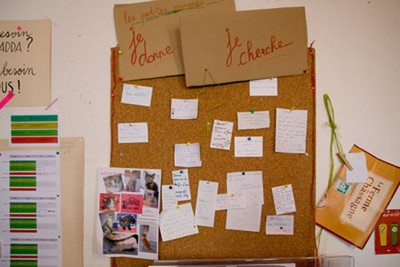
List of objects to give out

Discussion in the kitchen
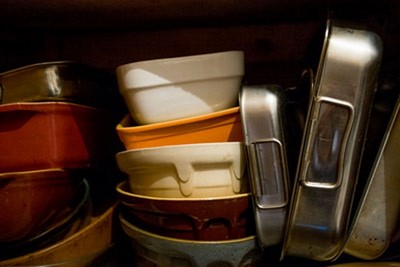
Equipment
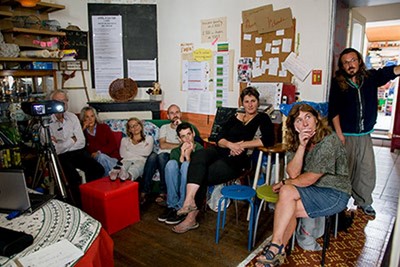
Screening
One of the fundamental choices of the association
has been not to have any employee
This choice enables to offer quality products at a fair price as well as financial independence.
But it also arises many questions. What happens if no one takes care of the tasks required to the running of the association such as restocking, accounting and opening hours?
« It matters more to us to be independent than to continue to exist by depending on someone »
For a long time, Claire was in charge of most of the tasks. She was so involved people wondered if ADDA could live without her support...
Since a few years now, she has been stepping back. She and the other members have agreed about it, and she now wishes to take more distance in order for ADDA to live its own life.
The organisation of the tasks to carry out has been made clearer and easily identifiable for everyone to enroll in the different activities of the ADDA. And the soft shift has started. More and more tasks and activities are taken over by the members, which brings novelty.
And if ever a task has been left vacant, Claire makes sure she does not step in...
"ADDA is like my fifth child"
Claire
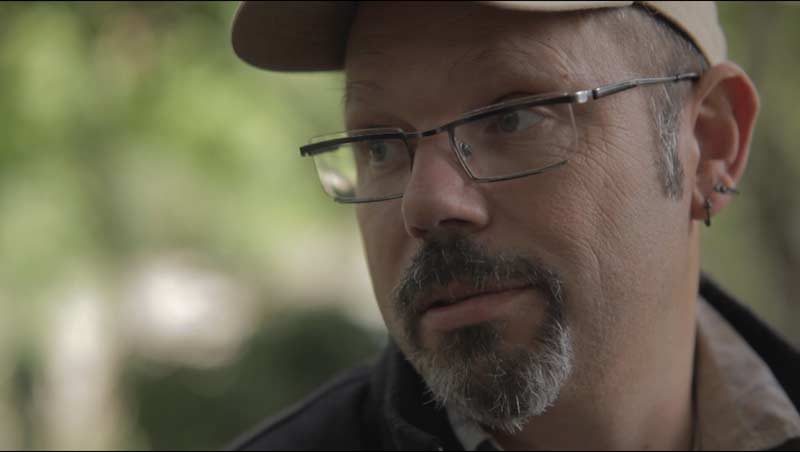
« Food is just an excuse and it leads to an experiment on anything »
Xavier

If ADDA continuously evolves thanks to the implication of its members, it also means a continuous re-assessment of all its practices and activities, especially in view of going further towards ecological transition.
This is how they have thought of and tried to set up a local currency, an environmentally friendly vehicle, the 0% solidarity financing and many other initiatives.
« We do things, we draw conclusions and if it has worked, we carry on. If it has not worked, we try again »
Claire
The way of running the association is also constantly evolving. The board members have educated themselves to nonviolent communication and the techniques of collective work and consensus decision-making enabling to work calmer, fairer and more efficiently. For over two years now, the board members have set up a process that allows new members willing to get involved into decision-making to do so.
« It works really well, but I think there is still room for improvement »
Mika
The ADDA started about 7 years ago. It is in constant evolution. We show it here as it was in 2014... It may be different in 2015.

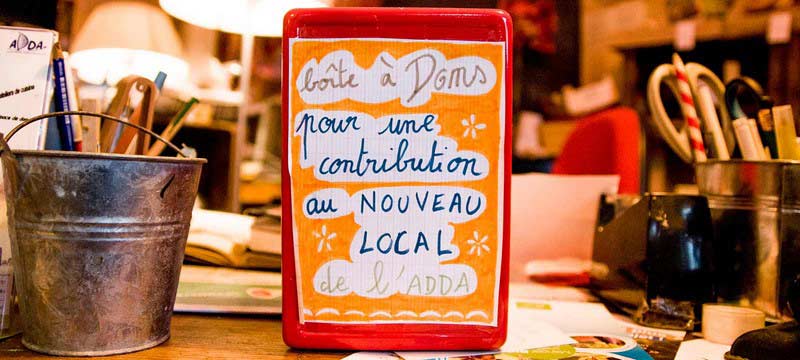
Incidentally, a memorable event will soon take place. The current place, which until now had been generously lent, is up for sale.
The association needs to move out
All the different solutions have been considered: buying, renting, portable housing, squatting, splitting, or closing. A notebook 'If ADDA was to disappear...' has been set up for people to express what ADDA represents to them.
After we left, a solution was adopted: the association will join a dozen others in a city-owned space, only 500 meters away from the former place. A new life will structure itself within a newly-arranged home, with new possibilities and new challenges to take up with inspiration.
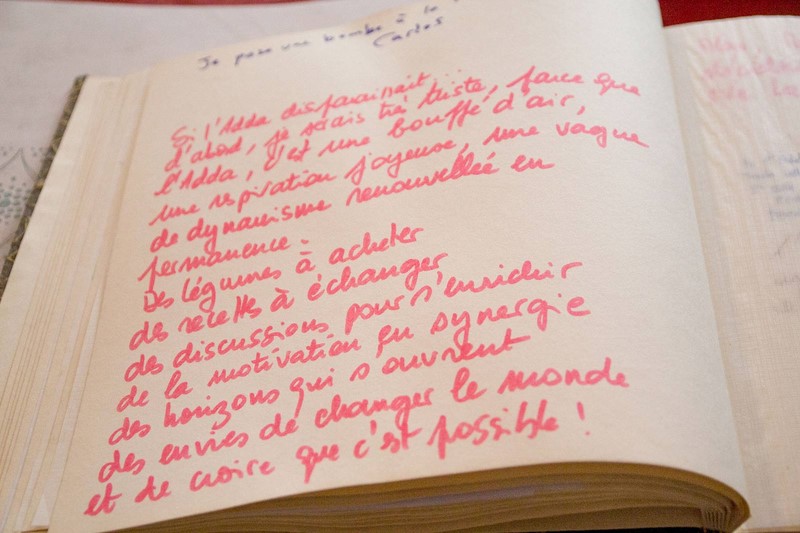
Find out more about ...
... ADDA
Association ADDA - Aujourd'hui restaurons demain
Address : Salle Marion Cahour / 18 rue de Savenay / 44000 Nantes
Website : addo.asso.fr
Discover as well interview extracts on Soundcloud and you can download the transcript of the interviews of Claire, Mika and Xavier (in French).
... the collective places of proximity
ADDA is what we could call a collective place of proximity: neither a public nor a private space, it is a place that members can claim in order to share, be creative and live a common experience.
Each collective place of proximity has its own way in, its independent ways, its own position. The approach is more or less dedicated to opening up and being independent. It will mostly depend on those who set it up and use it.
« I do not have any solution or miracle recipe to pass on, I just want to speak up and encourage people to be active members of community life. »
Claire
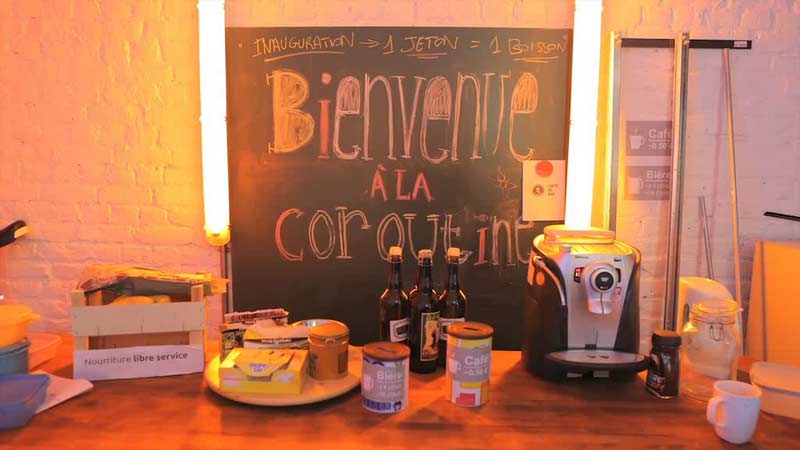
Another example, the Coroutine
This coworking space located in Lille was initiated by a group of friends, all independent IT engineers, willing to share a common work space rather than work at home and by themselves. They rented out a common work space and opened it to whoever was interested in joining in.
Based on self-management, the Coroutine has grown gradually with the arrival of new members. Today they occupy a 150 m2 space next to the Lille town hall.
On the first floor, a kitchen, a bar and a meeting room host the numerous activities offered by the ever-growing number of members. Sometimes the new members join for other reasons and needs than the original service offered by the coworking space.
A local farmer brings in a delivery of vegetables ordered once a week. The members have managed to offer a common meal every lunch time (signing in is requested before 11 am) for 3 euros. Every summer, a place in the countryside is arranged in order to host workshops on self-building and the implementation of the FabLab skills - hosted at the Coroutine - in view of building a TinyHouse (an ecologically friendly cabin on wheels), etc...
Find out more about: lacoroutine.org
What about in your neighborhood?
Citizen-led actions are becoming more and more visible. They allow to bring energies together with the purpose of creating positive dynamics at a community level. Joining them enables you to get information about the local projects and collaborations near you.
Transition Network, enables people interested in taking part in the transition to get together and collaborate in order to act locally and according to their means of action.
Alternatiba is a festival that organizes for a few days the get-together of all the alternative initiatives taking place near you. Its organization is self-managed by the members of the various associations taking part in it. To find out if a festival is scheduled near you, go and check their website.
Do not hesitate to inform us of any amazing initiative that could be added to this list! Contact us!
